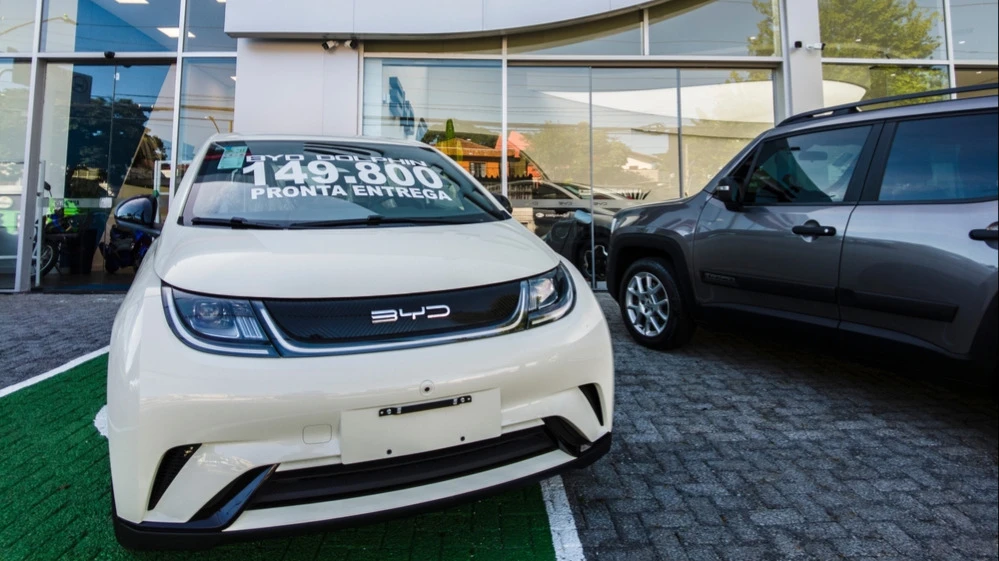China's price war has wiped out nearly a third of BYD's profits. Is it a risk for investors?
Electric car maker's profit came in 38% below analysts' expectations

Shares of BYD, China's largest electric car maker, tumbled 5% on September 1, as the company reported a nearly one-third drop in quarterly profit after doubling it in the quarter before. BYD's margins have been squeezed by China's price war, with rival manufacturers cutting prices significantly this year to stimulate weakening domestic demand. Analysts are not sure BYD can meet its sales target this year, but are not rushing to advise selling the stock.
Details
BYD shares fell 5.2 percent to close at 108.4 Hong Kong dollars ($13.9) in Hong Kong trading on Monday. That's their lowest value since April 9. However, the electric car maker's securities are still up 22% compared to the start of 2025.
Investors were disappointed by BYD's net profit in the second quarter: it fell 29.9% year-on-year to 6.36 billion yuan (about $890 million), the company said on Friday, August 29. Analysts had expected 38% more: 10.24 billion yuan, according to FactSet data cited by Reuters. BYD's net profit fell for the first time in more than three years, Reuters noted. By comparison, BYD's first-quarter profit, in contrast, doubled year-on-year .
At the same time, the automaker's revenue rose 14% to 200.9 billion yuan ($28.18 billion). Analysts expected 206.9 billion yuan. According to the results of the first half of the year, the company's profit increased by about 14%, and revenue - by 23%.
Why profits have fallen
Competing electric car makers in China have cut prices significantly this year to offset weakening domestic demand, forcing BYD to offer hefty discounts to protect its market share. The report showed how much this has hit BYD's net profit, Barron's noted.
BYD set a goal to sell 5.5 million cars worldwide in 2025, but in the first seven months of the year sold 2.49 million, that is, only 45% of the target, writes Reuters. On Monday, September 1, BYD released sales figures for August: with them, the total YTD result rose to 2.86 million - or 52% of the target.
At the same time, BYD's production pace is slowing: it fell for the second consecutive month in August, the first time this has happened to the company since 2020, Reuters reported. This shows that BYD is slowing down the pace of its rapid expansion, which the company has been pursuing in recent years, the agency said.
Analysts also noticed a renewed rise in BYD's working capital deficit (the difference between current assets and liabilities): it reached $122.7 billion at the end of June, up from $95.8 billion at the end of March, Reuters added.
What the analysts are saying
"BYD's unexpectedly weak results" were the result of "a combination of sluggish sales momentum and structural headwinds eroding the company's once impressive competitive advantage," Jefferies analysts wrote in a note cited by Reuters.
Rising raw material costs, including components for the God's Eye driver assistance system, were one reason for BYD's weak margins, but the lackluster quarterly results still came as a surprise, Morgan Stanley analysts said as quoted by Bloomberg. "We wonder if there are no one-off or so-called kitchen-sinking factors here (the principle where all bad news is announced at once rather than gradually. - Oninvest) that made the second quarter a period of deep margin slippage, followed by more aggressive cost-cutting starting in the third quarter," Morgan Stanley analysts said.
Bernstein called BYD's declining margins and profits "competitive scars," Bloomberg reported. The bank's analysts, led by Eunice Li, said margin pressure persists despite increased sales outside China. Active promotions "have not resulted in the expected increase in demand," and higher capital expenditures have further eroded profitability, they wrote.
But Bernstein believes BYD will be able to sell 5.1 million vehicles in 2025, and therefore calls the automaker the best buy idea in the sector. The company's analysts maintained an Outperform rating ("above market") for BYD shares, but lowered its target price from HK$133 to HK$130. That's still 20% above the closing price on Sept. 1.
According to Bloomberg Intelligence analyst Joanna Chen, BYD's margins in the second half of the year may recover after a tough second quarter, but will still remain below 2024 levels due to fierce competition in the domestic market. She expects demand in China to pick up in the fourth quarter due to the upcoming imposition of higher taxes on electric vehicles. Still, annual sales are likely to reach 5 million units, below the company's target of 5.5 million, Chen suggested.
BYD securities have a total of 26 ratings from analysts and the consensus view is that they are worth buying, MarketScreener shows.
This article was AI-translated and verified by a human editor
